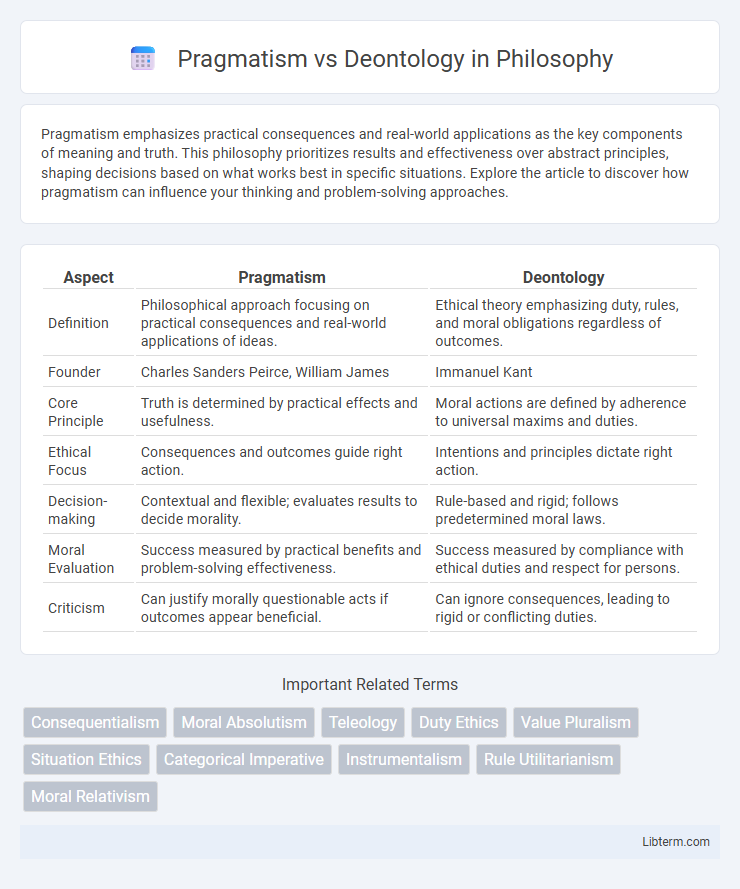Pragmatism emphasizes practical consequences and real-world applications as the key components of meaning and truth. This philosophy prioritizes results and effectiveness over abstract principles, shaping decisions based on what works best in specific situations. Explore the article to discover how pragmatism can influence your thinking and problem-solving approaches.
Table of Comparison
| Aspect | Pragmatism | Deontology |
|---|---|---|
| Definition | Philosophical approach focusing on practical consequences and real-world applications of ideas. | Ethical theory emphasizing duty, rules, and moral obligations regardless of outcomes. |
| Founder | Charles Sanders Peirce, William James | Immanuel Kant |
| Core Principle | Truth is determined by practical effects and usefulness. | Moral actions are defined by adherence to universal maxims and duties. |
| Ethical Focus | Consequences and outcomes guide right action. | Intentions and principles dictate right action. |
| Decision-making | Contextual and flexible; evaluates results to decide morality. | Rule-based and rigid; follows predetermined moral laws. |
| Moral Evaluation | Success measured by practical benefits and problem-solving effectiveness. | Success measured by compliance with ethical duties and respect for persons. |
| Criticism | Can justify morally questionable acts if outcomes appear beneficial. | Can ignore consequences, leading to rigid or conflicting duties. |
Introduction to Pragmatism and Deontology
Pragmatism emphasizes practical consequences and real-world applications of moral decisions, prioritizing outcomes over rigid rules. Deontology, rooted in Kantian ethics, asserts that actions must follow universal moral principles regardless of results. These contrasting frameworks serve as foundational ethical theories guiding decision-making in philosophy and applied ethics.
Historical Background of Pragmatism
Pragmatism emerged in the late 19th century, primarily developed by philosophers Charles Sanders Peirce and William James as a response to the abstract nature of traditional philosophy, emphasizing practical consequences and experiential learning. Rooted in American intellectual tradition, pragmatism challenged the rigid moral frameworks by promoting adaptability and action-based ethics. This philosophical movement influenced various fields, including education, law, and science, by advocating that the truth of ideas is determined by their effectiveness in real-world applications.
Origins and Development of Deontological Ethics
Deontological ethics originated primarily from Immanuel Kant's 18th-century philosophy, emphasizing duty, moral rules, and the intrinsic rightness or wrongness of actions regardless of consequences. Rooted in rationalism and Enlightenment thought, it developed as a response to consequentialist theories like utilitarianism, stressing universal moral laws derived from reason. Over time, this framework has expanded through contemporary philosophers who refine Kant's categorical imperative and incorporate rights-based perspectives.
Core Principles of Pragmatism
Pragmatism centers on practical consequences and real-world applications as the basis for determining truth and guiding ethical decisions, emphasizing flexibility and adaptability. This philosophy prioritizes outcomes, valuing ideas and actions that produce beneficial, tangible results. Pragmatism contrasts with deontology's strict adherence to moral rules, focusing instead on the dynamic assessment of situations to navigate ethical challenges effectively.
Fundamental Tenets of Deontology
Deontology centers on the principle that actions are morally right or wrong based on adherence to rules or duties, regardless of consequences. It emphasizes the intrinsic value of following ethical maxims derived from reason, such as Kant's categorical imperative, which demands treating individuals as ends in themselves. This framework asserts that moral obligations are universal and absolute, guiding behavior through clear-cut duties rather than outcomes.
Key Differences Between Pragmatism and Deontology
Pragmatism evaluates the morality of actions based on their practical outcomes and consequences, emphasizing flexibility and context in ethical decision-making. Deontology, by contrast, adheres to fixed moral rules or duties regardless of results, prioritizing principles such as honesty and justice as inherently right or wrong. Key differences include pragmatism's outcome-oriented approach versus deontology's rule-based framework, with pragmatism allowing adaptation to circumstances and deontology maintaining consistent moral obligations.
Strengths of Pragmatic Reasoning
Pragmatic reasoning excels in its flexibility and adaptability, allowing decision-makers to consider practical outcomes and real-world consequences rather than strictly adhering to predetermined rules. This approach prioritizes effectiveness and problem-solving in complex situations where rigid principles may fall short, fostering innovation and responsiveness. Pragmatism's emphasis on results-oriented thinking supports ethical decisions that are context-sensitive and grounded in tangible benefits.
Challenges and Critiques of Deontological Ethics
Deontological ethics faces challenges related to rigid rule adherence that can lead to conflicting duties and moral dilemmas without clear resolutions. Critics argue its inflexibility overlooks context, resulting in outcomes that may be morally counterintuitive or detrimental. The theory's emphasis on absolute principles often lacks practical guidance in complex, real-world scenarios where competing obligations must be balanced.
Real-World Applications: Pragmatism vs Deontology
Pragmatism in real-world applications emphasizes practical outcomes and flexible decision-making, adapting ethical choices based on context and consequences. Deontology prioritizes adherence to moral duties and rules, guiding actions by principles regardless of outcomes, which reinforces consistency in legal and professional settings. Balancing pragmatism's results-driven approach with deontology's rule-based ethics supports effective, ethical decision-making in complex scenarios like healthcare and business governance.
Conclusion: Choosing Between Pragmatism and Deontology
Choosing between pragmatism and deontology hinges on the context of moral decision-making; pragmatism emphasizes outcomes and practical consequences, while deontology prioritizes adherence to ethical rules and duties regardless of results. Pragmatism suits flexible, situational ethics requiring adaptability, whereas deontology offers clear moral guidance through universal principles. Ultimately, balancing practical impacts with principled integrity provides a comprehensive ethical framework.
Pragmatism Infographic

 libterm.com
libterm.com